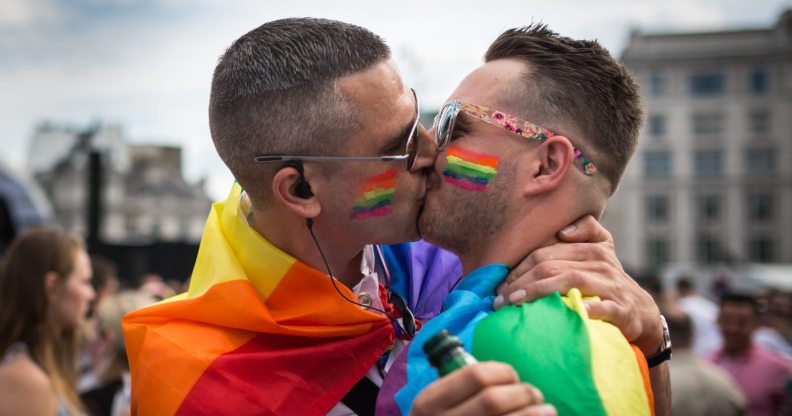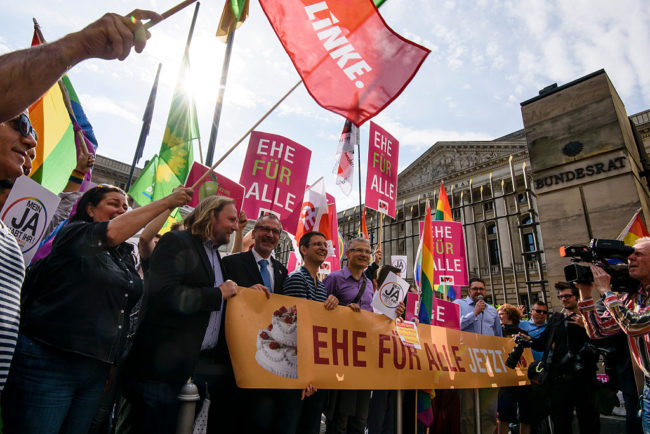Germany celebrates as first same-sex couples marry after law change

A gay couple kiss in Trafalgar Square after the annual Pride in London Parade 2015. (Photo by Rob Stothard/Getty Images)
Germans celebrated today as the first same-sex couples married after the law was changed to legalise the unions.
Karl Kreile and Bodo Mende, together for 38 years before they tied the knot, got married in Berlin today.
They are believed to be the first same-sex couple to marry under the new law.
They married at the Schoneberg, Berlin town hall at 09:30 local time.

Wedding rings
The couple met in 1979 and have campaigned for LGBT right since.
“We have finally achieved legal equality,” Mende said on Friday.
“It’s been 25 years’ of hard struggle to secure this.”
Registry offices in Germany opened especially as today was the first day that same-sex couples could marry.
It is expected that another dozen couples will marry in Berlin today.
German MPs back in June voted by a clear majority to legalise same-sex marriage.
After years of campaigning, things moved swiftly with a vote being announced, carried out and successfully passed in a matter of days.

Hands wedding rings
Chancellor Angela Merkel gave her Christian Democratic Union party a free vote in the proposal put forward by the Social Democrats – though Mrs Merkel herself voted against the legislation.

German Chancellor Angela Merkel (Adam Berry/Getty Images)
The vote passed in the Bundestag by a clear majority.
393 members of parliament voted in favour of the bill, with 296 voting against and 4 abstentions.
Previously, same-sex couples could not get married but instead only enter into civil unions.
Same-sex couples will from 1 October be able to have all the rights connected to existing marriage laws. This includes joint adoption.
The German legal code now reads: “Marriage is entered into for life by two people of different or the same sex.”
While she permitted the vote on Monday, Mrs Merkel was one of those who voted against the motion, having in the past admitted to having a “hard time” with the issue.
She recently revealed that meeting a lesbian couple who had eight foster children together changed her mind on whether or not a free vote should be allowed on the matter.
“After years of waiting and hoping, rainbow families in Germany will now receive equal recognition under the law,” said ILGA-Europe Executive Director Evelyne Paradis.
“This is a historic milestone that can inspire even more change for LGBTI people.”
She added: “This result has taken years of persistence – and now there is momentum in Germany. Marriage equality is not the final destination.

“LGBTI people and their families need to feel safe and supported in every facet of their lives – outside the civil registry office, as well as inside it.”
The quick movement towards the snap vote came ahead of a general election in Germany on September 24.
The election saw Germany’s far-right anti-gay party win seats in the country’s Parliament for the first time in more than half a century.
Merkel will remain in office for a fourth term.
Significant parties the Greens, Linke, and Free Democrats all vocally backed same-sex marriage and said they would not have entered into a coalition government unless the law was changed.

